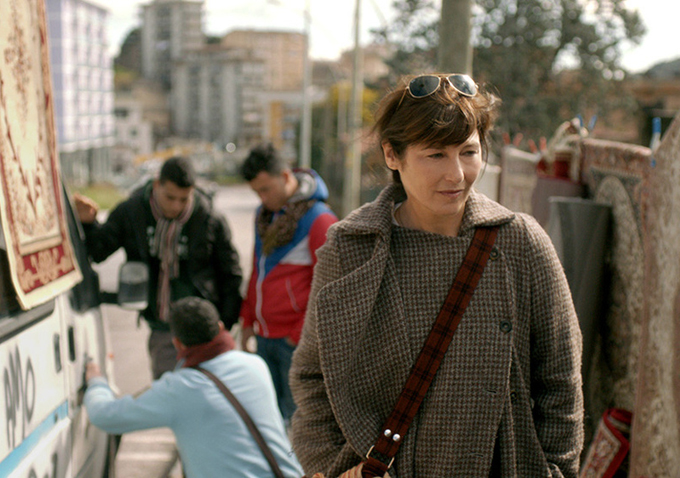 This is reprint of our review from the 2014 Sundance Film Festival.
This is reprint of our review from the 2014 Sundance Film Festival.
What
is behind the desire to punish an audience? Truthfully, few filmmakers besides Michael Haneke maybe intentionally want to
torture viewers (at least I think), but many dark and depressing indie movies
attempting to explore the condition of suffering can often feel excruciating.
There’s nothing inherently wrong with a grim and sad narrative—one so-called
“miserablist” movie I love is “Bitiful,” and last year’s bleak “Sunshine Jr.” had a lot of value. These emotions are part of our existence,
thus they shouldn’t be shied away from, but rather must be examined. But what is the value when a movie wallows in these
kinds of dire feelings without ever illuminating the human condition beyond the
superficial notion that grief is difficult? What then?
Devastation
both personal and removed shrouds “War Story” like an oppressive funeral veil devoid of light or air. Catherine Keener stars as Lee, a prickly war
photographer that has lived a large chunk of her adult life in treacherous war
zones, witnessing and documenting all kinds of tragedies in her day. Weary of
it all, Lee’s tough, cynical veneer is scorched to the ground after a
brutalizing experience in Libya. Taken hostage and nearly killed, Lee’s
colleague and best friend is murdered right before her eyes just for irritating
her guards. Taking refuge in nearby Italy, Lee sequesters herself in a hotel,
wanders the streets aimlessly, takes pictures of poor souls in refugee camps
and mourns.
 Working
Working
backwards with a reverse-engineered narrative, the Mark Jackson-helmed film (he directed the critically acclaimed "Without") almost acts as an
intriguing mystery initially, withholding any real disclosure of basic plot
information, but rather suggesting everything. Why is she here in this hotel?
Why is she distraught beyond capacity? Lee is suffering and unless you’ve read
the synopsis, you don’t know why and the film leaves you in the cold for a long
stretch.
It’s
a neat trick, but it wears out fast, and key narrative details aren’t confirmed
until about one hour into the movie. Of course, it’s easy to piece together,
but that doesn’t mean its forced ambiguity isn’t exasperating and contrived. In
her favorite Sicilian hotel, Lee bitterly clashes with the hotel staff, she
smokes relentlessly, destroys her hotel rooms and avoids phone calls from
friends and family, including those calling about funeral arrangements for the
colleague she loved.

And,
while initially a distressing portrait of grief and psychic collapse, “War
Story” soon turns into a turgidly self-serious drama of moping and grief that
largely goes nowhere. Clearly suffering from terrible PTSD, Lee wants nothing
to do with hospitals, doctors, friends or anyone else. And so “War Story” is a
ponderous and undramatic tale of trauma, one that centers on a woman on the
verge of a nervous breakdown who is unlikable and unfriendly to boot.
To
be deeply glib about it, “War Story” is a terminally sluggish 90 minutes of Catherine Keener crying, grieving, mourning,
crying and grieving in dankly lit rooms for what feels like an eternity. The
would-be salvation of the picture involves a Tunisian refuge (Hafsia Herzi), who Lee believes
resembles a girl she once photographed draped over her murdered brother in
Libya. The idea of how the distressed photographer can transfer her pain by
helping this girl is explored, but this section of the movie mostly feels like
a tangential subplot rather than the turning point of healing that the movie
desperately needs. Furthermore, this story revolves around the young girl’s
painful abortion, which is as horrible as it sounds.
 Ben Kingsley appears for five minutes to
Ben Kingsley appears for five minutes to
give the movie’s only expository dialogue and to actually spell-out what Lee’s
been grieving about all this time, but so much time has transpired by then that
it’s hard to care. Spike Jonze cameos as the dead photographer only shown in pictures (she’s a
Keener bff), but otherwise the Mark Jackson-directed movie about a war
photographer who loses her best friend and then retreats to Italy while
avoiding his relatives and funeral, is so austere and soul-crushingly bleak it
becomes spiritually enervating.
Elusively told to the point of a irritation, joyless and shot in chilly incarcerating rooms, “War Story” has the look and feel of an exhausted ashtray and borders on the pretentiously unclear. Jackson frames shots opaquely, and instead of constructing an embracing empathy for this woman, the picture’s emotionally distancing formalism puts us more than arm’s length away, leaving its vague ending as a fait accompli for what’s left of your sympathy. A baffling picture with the strangest, most aloof intentions and form, it’s unclear what sort of audience “War Story” intends to draw in, outside of the foolishly fringe-curious. Commercial prospects for this film—even in arthouse, indie VOD circles—are going to be dismal. “War Story” is ultimately a movie about connection. Lee’s been through the ringer and Hafsia may help her transcend her anguish. But what we’re mostly left with is a rigorous deliberation of psychic wounds that are never healed, relieved or liberated. [D-]

